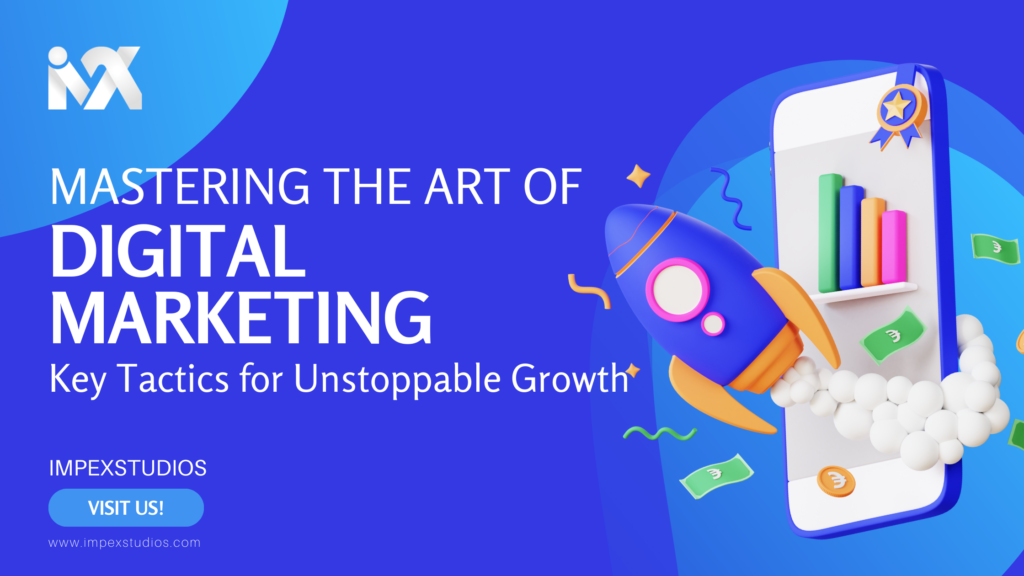Mastering the Art of Digital Marketing: Key Tactics for Unstoppable Growth

Introduction
In today’s business landscape, digital marketing has become a crucial component for achieving success. With the potential for exponential growth, businesses that employ effective digital marketing strategies have a greater advantage in reaching their target audience and driving unparalleled growth.
Understanding Digital Marketing

Defining digital marketing and its components
Digital marketing is the practice of promoting products or services through electronic media, utilizing various digital channels such as websites, social media platforms, search engines, and email marketing. It encompasses a range of components, including search engine optimization (SEO), content marketing, social media marketing, pay-per-click (PPC) advertising, email marketing, influencer marketing, data analytics, and more.
Exploring the evolution of digital marketing
Digital marketing has evolved significantly over the years, adapting to the ever-changing landscape of technology and consumer behavior. From its early beginnings with basic online advertising to the sophisticated strategies of today, digital marketing has embraced innovation and emerged as a powerful tool for businesses to engage with their target audience.
The role of digital marketing in different industries
Digital marketing plays a vital role in various industries, regardless of their size or nature. From e-commerce giants to mom-and-pop shops, businesses across sectors can benefit from implementing effective digital marketing strategies. It enables them to connect with potential customers, enhance brand awareness, drive website traffic, generate leads, increase sales, and ultimately achieve their business objectives.
Setting Clear Marketing Objectives

Identifying specific goals for digital marketing campaigns
To ensure success in digital marketing, it is crucial to set clear and measurable objectives for each campaign. Whether it’s increasing website traffic, improving conversion rates, or expanding market reach, well-defined goals provide a roadmap for success and enable businesses to track progress effectively.
Aligning objectives with overall business objectives
An essential aspect of digital marketing is aligning marketing objectives with the overall objectives of the business. By ensuring that marketing efforts contribute to the broader goals, businesses can maximize the impact and effectiveness of their digital marketing strategies.
Key performance indicators for measuring success
Key performance indicators (KPIs) serve as valuable metrics to measure the success of digital marketing efforts. These can include website traffic, conversion rates, social media engagement, email open rates, and customer lifetime value. By monitoring and analyzing KPIs, businesses can identify areas for improvement and make data-driven decisions to optimize their marketing strategies.
Building a Strong Online Presence
Creating a powerful brand identity
Developing a strong brand identity is essential for building a solid online presence. This involves understanding the target audience, establishing brand values, designing a compelling brand logo and visual assets, and crafting a compelling brand story that resonates with customers.
Designing an appealing and user-friendly website
A well-designed website is crucial for attracting and engaging visitors. It should incorporate visually appealing elements, intuitive navigation, and quick loading times. Additionally, optimizing the website for mobile devices ensures a seamless user experience and accommodates the increasing number of mobile users.
Utilizing search engine optimization (SEO) strategies
Implementing effective SEO strategies helps businesses improve their website’s visibility on search engine results pages. This involves optimizing website content, utilizing relevant keywords, improving website speed and performance, and building high-quality backlinks. By enhancing their website’s SEO, businesses can increase organic traffic and attract more potential customers.
Content Marketing Strategies
Developing a content marketing plan
A comprehensive content marketing plan involves identifying target audiences, conducting market research, setting content objectives, and developing a content calendar. It should outline the types of content to create, platforms to leverage, and the frequency of publishing. A well-planned content marketing strategy ensures consistency, relevancy, and effectiveness in reaching and engaging the target audience.
Crafting compelling and engaging content
Compelling and engaging content is the cornerstone of successful digital marketing. It should be informative, entertaining, and tailored to the target audience’s preferences and needs. Utilizing storytelling techniques, incorporating visual elements, and ensuring a conversational tone helps capture attention and keep readers engaged.
Leveraging different content formats (blogs, videos, infographics, etc.)
Diversifying content formats allows businesses to cater to different audience preferences. By incorporating a mix of blogs, videos, infographics, podcasts, and interactive content, businesses can provide valuable and engaging information in various ways. This multi-format approach enhances the overall user experience and increases the reach and impact of the content.
Social Media Marketing
Understanding the role of social media in digital marketing
Social media platforms have become integral to digital marketing strategies. They offer businesses a direct channel to connect with their target audience, build relationships, and amplify brand messages. Social media marketing allows businesses to engage in conversations, provide customer support, share content, and reach a wider audience.
Choosing the right social media platforms for the target audience
Selecting the appropriate social media platforms is essential to ensure effective targeting and engagement. By understanding the demographics, interests, and behaviors of the target audience, businesses can identify the platforms where they are most active and tailor their social media marketing efforts accordingly.
Creating a social media marketing plan
Developing a social media marketing plan involves setting objectives, determining the content mix, scheduling posts, engaging with followers, and analyzing performance. It should consider the unique features and dynamics of each platform to ensure consistency and maximize the reach and impact of social media marketing efforts.
Pay-Per-Click (PPC) Advertising
Exploring the benefits and drawbacks of PPC advertising
PPC advertising offers businesses the opportunity to reach a highly targeted audience and achieve fast results. It allows for precise budget control, immediate visibility, and measurable ROI. However, PPC advertising can be cost-intensive if not managed effectively and may require continuous optimization to achieve optimal results.
Conducting keyword research for effective PPC campaigns
Keyword research is a crucial aspect of successful PPC campaigns. By identifying the keywords that align with the target audience’s search intent, businesses can optimize their ad campaigns for maximum visibility and relevancy. Conducting thorough research, utilizing keyword tools, and monitoring competitors can help businesses identify valuable keywords to target.
Optimizing PPC ads for higher conversions
To maximize conversions, optimizing PPC ads is essential. This involves writing compelling ad copy, incorporating relevant keywords, utilizing appealing visuals, and creating effective calls-to-action. By continuously monitoring and optimizing ad performance, businesses can improve click-through rates, increase conversions, and maximize the ROI of their PPC advertising efforts.
